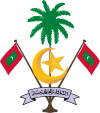Irreligion in the Maldives
Irreligion in the Maldives is a social taboo, and irreligious people are systematically socially and legally discriminated against.
Law
The Constitution of the Maldives designates Islam as the official state religion,[1][2] and the government and many citizens at all levels interpret this provision to impose a requirement that all citizens must be Muslims. The Constitution states the president must be a Sunni Muslim. There is no freedom of religion or belief.[3] This situation leads to institutionally sanctioned religious oppression against non-Muslims and ex-Muslims who currently reside in the country.
On 27 April 2014, the Maldives ratified a new regulation that revived the
Incidents
Mohammed Nazim
During a question-and-answer session at one of Indian Muslim orator
Mohamed Nazim was reported to have been arrested and put in protective custody by the Maldivian Police. He later publicly reverted to Islam in custody after receiving two days of counseling by two Islamic scholars, but was held awaiting possible charges.[10][11][12]
Ismail Mohammed Didi
On July 14, 2010, Maldivian news site Minivan News
References
- ^ "International Religious Freedom Report for 2017". www.state.gov. Retrieved 30 December 2018.
- ^ "Maldives's Constitution of 2008" (PDF). constituteproject.org. Retrieved 29 October 2017.
- International Humanist and Ethical Union. Retrieved 12 November 2017.
- ^ "MALDIVES 2012 INTERNATIONAL RELIGIOUS FREEDOM REPORT" (PDF). 2012. Retrieved 2015-08-05.
- ^ "Maldives: non-Muslims to lose citizenship : News :: Inspire Magazine". www.inspiremagazine.org.uk. Retrieved 2015-08-05.
- ^ "Maldives enacts regulation for death penalty". Al Jazeera English. 1 May 2014. Retrieved 12 November 2017.
- ^ "Maldives should repeal new regulation providing for death penalty, says UN rights office". UN News Centre. United Nations. 29 April 2014. Retrieved 12 November 2017.
- ^ a b Maldivian man asks Naik about what the verdict is to be regarding his lack of faith Youtube 2010-06-03
- ^ Maldivian renounces Islam, gets attacked by Zakir Naik audience Archived 2011-08-10 at the Wayback Machine Haveeru Daily (English Ed.) 2010-05-30
- ^ What will happen to the Maldivian who renounced Islam? Archived 2010-08-30 at the Wayback Machine Haveeru Daily (English Ed.) 2010-05-31
- ^ Maldivian who renounced Islam reverts back Archived 2010-12-12 at the Wayback Machine Haveeru Daily (English Ed.) 2010-06-01
- ^ Islamic Foundation calls for death sentence if apostate fails to repent Archived 2010-06-02 at the Wayback Machine Minivan News 2010-05-30
- ^ JJ Robinson (July 14, 2010). "Hanged air traffic controller sought asylum for fear of religious persecution". Minivan News. Archived from the original on July 17, 2010. Retrieved July 16, 2010.
- ^ Charles Haviland (15 July 2010). "Maldives atheist who felt persecuted 'hangs himself'". BBC News.

